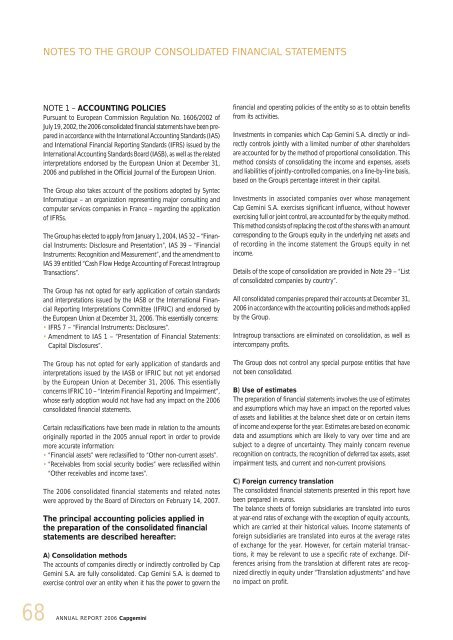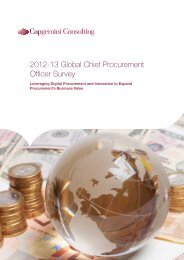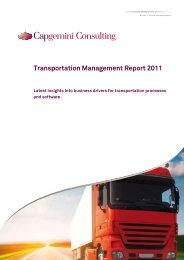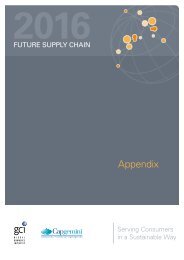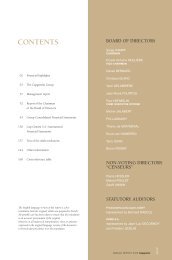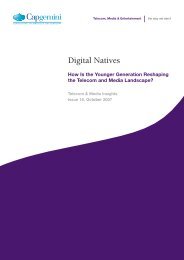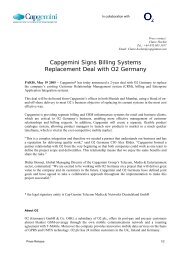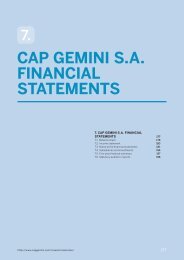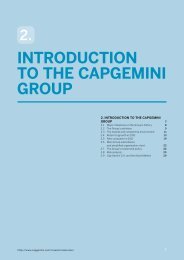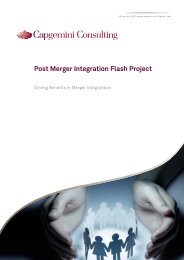You also want an ePaper? Increase the reach of your titles
YUMPU automatically turns print PDFs into web optimized ePapers that Google loves.
68 ANNUAL<br />
NOTES TO THE GROUP CONSOLIDATED FINANCIAL STATEMENTS<br />
NOTE 1 – ACCOUNTING POLICIES<br />
Pursuant to European Commission Regulation No. 1606/2002 of<br />
July 19, 2002, the 2006 consolidated financial statements have been prepared<br />
in accordance with the International Accounting Standards (IAS)<br />
and International Financial Reporting Standards (IFRS) issued by the<br />
International Accounting Standards Board (IASB), as well as the related<br />
interpretations endorsed by the European Union at December 31,<br />
2006 and published in the Official Journal of the European Union.<br />
The Group also takes account of the positions adopted by Syntec<br />
Informatique – an organization representing major consulting and<br />
computer services companies in France – regarding the application<br />
of IFRSs.<br />
The Group has elected to apply from January 1, 2004, IAS 32 – “Financial<br />
Instruments: Disclosure and Presentation”, IAS 39 – “Financial<br />
Instruments: Recognition and Measurement”, and the amendment to<br />
IAS 39 entitled “Cash Flow Hedge Accounting of Forecast Intragroup<br />
Transactions”.<br />
The Group has not opted for early application of certain standards<br />
and interpretations issued by the IASB or the International Financial<br />
Reporting Interpretations Committee (IFRIC) and endorsed by<br />
the European Union at December 31, 2006. This essentially concerns:<br />
IFRS 7 – “Financial Instruments: Disclosures”.<br />
Amendment to IAS 1 – “Presentation of Financial Statements:<br />
Capital Disclosures”.<br />
The Group has not opted for early application of standards and<br />
interpretations issued by the IASB or IFRIC but not yet endorsed<br />
by the European Union at December 31, 2006. This essentially<br />
concerns IFRIC 10 – “Interim Financial Reporting and Impairment”,<br />
whose early adoption would not have had any impact on the 2006<br />
consolidated financial statements.<br />
Certain reclassifications have been made in relation to the amounts<br />
originally reported in the 2005 annual report in order to provide<br />
more accurate information:<br />
“Financial assets” were reclassified to “Other non-current assets”.<br />
“Receivables from social security bodies” were reclassified within<br />
“Other receivables and income taxes”.<br />
The 2006 consolidated financial statements and related notes<br />
were approved by the Board of Directors on February 14, 2007.<br />
The principal accounting policies applied in<br />
the preparation of the consolidated financial<br />
statements are described hereafter:<br />
A) Consolidation methods<br />
The accounts of companies directly or indirectly controlled by Cap<br />
Gemini S.A. are fully consolidated. Cap Gemini S.A. is deemed to<br />
exercise control over an entity when it has the power to govern the<br />
REPORT 2006 <strong>Capgemini</strong><br />
financial and operating policies of the entity so as to obtain benefits<br />
from its activities.<br />
Investments in companies which Cap Gemini S.A. directly or indirectly<br />
controls jointly with a limited number of other shareholders<br />
are accounted for by the method of proportional consolidation. This<br />
method consists of consolidating the income and expenses, assets<br />
and liabilities of jointly-controlled companies, on a line-by-line basis,<br />
based on the Group’s percentage interest in their capital.<br />
Investments in associated companies over whose management<br />
Cap Gemini S.A. exercises significant influence, without however<br />
exercising full or joint control, are accounted for by the equity method.<br />
This method consists of replacing the cost of the shares with an amount<br />
corresponding to the Group’s equity in the underlying net assets and<br />
of recording in the income statement the Group’s equity in net<br />
income.<br />
Details of the scope of consolidation are provided in Note 29 – “List<br />
of consolidated companies by country”.<br />
All consolidated companies prepared their accounts at December 31,<br />
2006 in accordance with the accounting policies and methods applied<br />
by the Group.<br />
Intragroup transactions are eliminated on consolidation, as well as<br />
intercompany profits.<br />
The Group does not control any special purpose entities that have<br />
not been consolidated.<br />
B) Use of estimates<br />
The preparation of financial statements involves the use of estimates<br />
and assumptions which may have an impact on the reported values<br />
of assets and liabilities at the balance sheet date or on certain items<br />
of income and expense for the year. Estimates are based on economic<br />
data and assumptions which are likely to vary over time and are<br />
subject to a degree of uncertainty. They mainly concern revenue<br />
recognition on contracts, the recognition of deferred tax assets, asset<br />
impairment tests, and current and non-current provisions.<br />
C) Foreign currency translation<br />
The consolidated financial statements presented in this report have<br />
been prepared in euros.<br />
The balance sheets of foreign subsidiaries are translated into euros<br />
at year-end rates of exchange with the exception of equity accounts,<br />
which are carried at their historical values. Income statements of<br />
foreign subsidiaries are translated into euros at the average rates<br />
of exchange for the year. However, for certain material transactions,<br />
it may be relevant to use a specific rate of exchange. Differences<br />
arising from the translation at different rates are recognized<br />
directly in equity under “Translation adjustments” and have<br />
no impact on profit.


